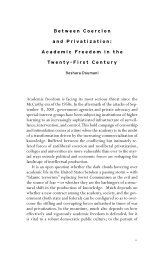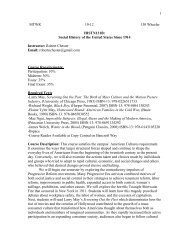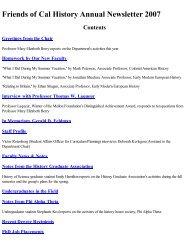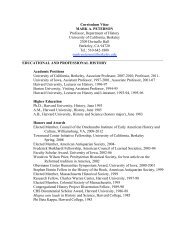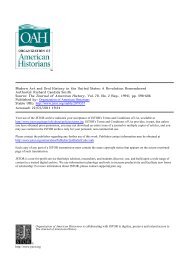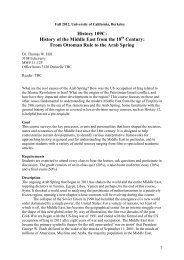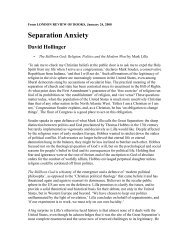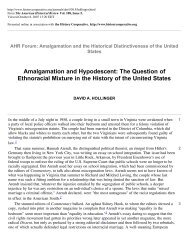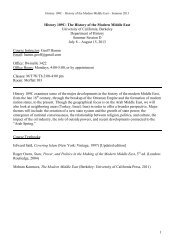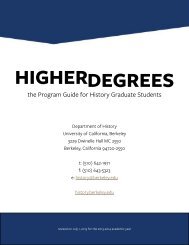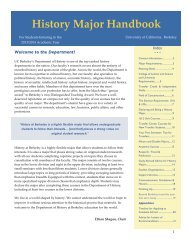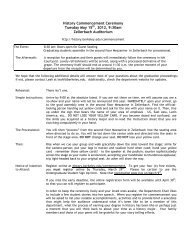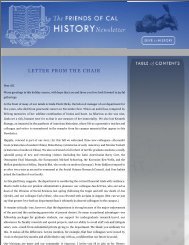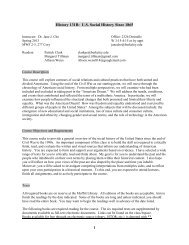My Grandmother and Other Stories: Histories of the Palestinians as ...
My Grandmother and Other Stories: Histories of the Palestinians as ...
My Grandmother and Other Stories: Histories of the Palestinians as ...
Create successful ePaper yourself
Turn your PDF publications into a flip-book with our unique Google optimized e-Paper software.
merger with Egypt far-fetched, <strong>and</strong> <strong>the</strong> independence <strong>of</strong> Palestine created fears among<br />
nationalists that it would have to face <strong>the</strong> Zionist movement alone. There w<strong>as</strong> a return to<br />
sentiment favourable to greater Syria. “The idea <strong>of</strong> joining Palestine to Syria is spreading<br />
powerfully those days”, wrote Khalil Sakakini in his diary on 20 January, 1919.<br />
People say: Palestine <strong>and</strong> Syria are two sisters visited toge<strong>the</strong>r by<br />
cat<strong>as</strong>trophes so far, <strong>and</strong> by a common thirst for freedom <strong>and</strong> independence.<br />
Now <strong>the</strong>y must have <strong>the</strong> same fate, <strong>and</strong> under no circumstance should one<br />
be amputated from <strong>the</strong> o<strong>the</strong>r. At <strong>the</strong> same time <strong>the</strong> notion <strong>of</strong> ‘Palestine for<br />
<strong>the</strong> <strong>Palestinians</strong>’ <strong>and</strong> full independence is retreating, <strong>and</strong> you have many<br />
people who are against <strong>the</strong> idea [<strong>of</strong> independence] altoge<strong>the</strong>r. 52<br />
Sakakini’s views were echoed by a large number <strong>of</strong> local nationalists.<br />
Unsentimental Education<br />
Ihsan’s world outlook w<strong>as</strong> at once secular, pacifist <strong>and</strong> comp<strong>as</strong>sionate. One is struck<br />
by his cosmopolitan outlook given his traditional family milieu, limited education,<br />
<strong>and</strong> even more limited life experience <strong>and</strong> young age when he w<strong>as</strong> drafted into <strong>the</strong><br />
army. We know that his fa<strong>the</strong>r H<strong>as</strong>an had insisted that his sons <strong>and</strong> daughters receive<br />
a Qur’anic education before <strong>the</strong>y were sent to (mostly) secular schools. 53 Ihsan’s<br />
natural (i.e. non-ideological) pacifism w<strong>as</strong> no doubt a reaction to <strong>the</strong> carnage <strong>of</strong><br />
<strong>the</strong> war, <strong>and</strong> <strong>the</strong> death rate generated by dise<strong>as</strong>e <strong>and</strong> famine during WWI. But his<br />
outlook w<strong>as</strong> formed b<strong>as</strong>ically through interaction with several intellectual figures<br />
that influence his thinking in that period: Omar Saleh al-Barghouti, Adel Jaber, Musa<br />
Alami, Khalil Sakakini, Is’af N<strong>as</strong>h<strong>as</strong>hibi <strong>and</strong> cousin H<strong>as</strong>an al-Khalidi–who had just<br />
received his medical degree from Beirut. To <strong>the</strong>se we must add <strong>the</strong> towering figure<br />
<strong>of</strong> Rustum Haidar, <strong>the</strong> deputy director <strong>of</strong> <strong>the</strong> Salihiyyah College in Dam<strong>as</strong>cus, who<br />
visited Jerusalem frequently <strong>and</strong> who met with Turjman during one <strong>of</strong> his visits to<br />
his teacher’s home. Within this group, Ihsan w<strong>as</strong> a young <strong>and</strong> impressionable soldier,<br />
<strong>and</strong> mainly an observer. His crucial link w<strong>as</strong> Sakakini, his teacher at <strong>the</strong> Dusturiyyah<br />
College (established in 1909). Ihsan continued to visit his teacher/mentor at le<strong>as</strong>t<br />
three or four times a week during <strong>the</strong> war years. It w<strong>as</strong> from Sakakini that he acquired<br />
<strong>the</strong> idea <strong>of</strong> recording his thoughts in a diary, but more significantly, he absorbed <strong>the</strong><br />
latter’s critical thinking about nationalism <strong>and</strong> his progressive views on children’s<br />
education <strong>and</strong> <strong>the</strong> emancipation <strong>of</strong> women.<br />
Turjman’s close circle <strong>of</strong> friends challenges <strong>the</strong> prevailing <strong>as</strong>sumption about <strong>the</strong> late<br />
Ottoman period, which suggests that Arabs’ acquisition <strong>of</strong> a secular <strong>and</strong> modernist<br />
education w<strong>as</strong> confined to mission schools (Russian seminaries in Nazareth <strong>and</strong><br />
Bayt Jala, <strong>the</strong> La Salles Bro<strong>the</strong>rs in Jaffa <strong>and</strong> Jerusalem, St. Joseph’s Schools <strong>and</strong><br />
[ 42 ] HISTORICAL FEATURES The Short Life <strong>of</strong> Private Ihsan



